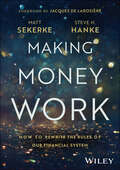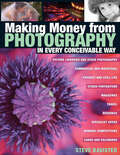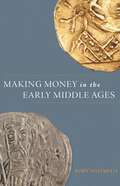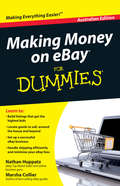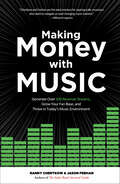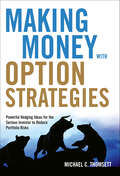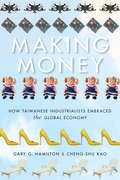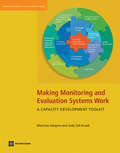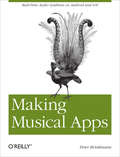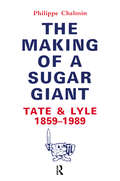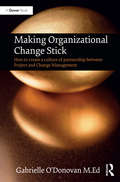- Table View
- List View
Making Money Work: How to Rewrite the Rules of Our Financial System
by Matt Sekerke Steve H. HankeThe Global Financial Crisis broke the monetary system. Here's how to fix it. In Making Money Work: How to Rewrite the Rules of Our Financial System, Matt Sekerke and Steve H. Hanke deliver a rigorous and fascinating exploration of the monetary economy. You'll find a detailed and clear roadmap of how and why fiat money is created and destroyed, its connections to the broader economy, and the objective mechanisms that underwrite and maintain its value. In their exploration, Sekerke and Hanke solve many problems and puzzles and shed light on several important questions: Why economists misunderstand the structure and function of the monetary system The central role of the commercial banking system in fiat money regimes, and why commercial banks are not like other financial intermediaries The economic and regulatory constraints on bank money creation The interplay between banking and capital markets in funding investment projects How the “banks” that dominate the international financial landscape distort the lines between banking and capital markets business Why banking regulation and fiscal policy determine and constrain monetary policy to an equal or greater extent than central bank actions Sekerke and Hanke trace important post-crisis policy developments and sketch the broad strokes of a new operating model that would restore the performance of the monetary system and make better use of aggregate savings: Making neutrality the explicit goal of monetary policy, properly understood Increasing the supply of bankable projects and keeping them on bank balance sheets Breaking the financial system's fatal attraction to land and real estate Reducing regulatory distortions in lending markets Reforming universal banking institutions and stimulating competition Transitioning to a quantity-based monetary policy framework An engaging and incisive guide to the global systems of money and banking, Making Money Work is destined to become a sought-after classic for bankers, finance professionals, policymakers, regulators, academics, and laypeople with an interest in money and banking.
Making Money Work: The Teens' Guide to Saving, Investing, and Building Wealth (Financial Literacy for Teens)
by Kara McGuireA penny saved is a penny earned, we've all heard that old saying before. But savvy savers turn their pennies into dollars and even more. Learn about the various ways to save and how socking away a little money over time can vastly improve your life in the long run.
Making Money from Photography in Every Conceivable Way
by Steve BavisterIn this comprehensive manual, Steve Bavister gives an invaluable insight into the business of being a photographer, with tips and examples of how to take great pictures in every genre, including:Advice on shooting and selling stock photographyHow to get your work into picture librariesSuccessful strategies for wedding and portrait photographyInspirational, high-quality examples from top photographersTips on running your own photography business--This text refers to an out of print or unavailable edition of this title.
Making Money in Forex
by Ryan O'KeefeA practical guide to trading around the commitments of career and familyMaking Money in Forex will help aspiring traders successfully enter this field while maintaining a job. With this book, author Ryan O'Keefe explains his own personal journey to becoming a trader and shows you how to follow a similar path.O'Keefe describes his approach to trading and reveals his bargain hunting trading style, which is designed to capitalize on market trends. Throughout the book, O'Keefe pays a great deal of attention to trading psychology, learning to read price instead of indicators, and emphasizes that aspiring traders must find a strategy they are comfortable with and can implement with confidence.Addresses how you can successfully trade around the demands of your job and personal lifeReveals the author's "bargain hunting" style which can be used to reduce risk and maximize profitDiscusses how common trade management techniques may impact overall performanceProvides insights into structuring trading to minimize stressWritten in a straightforward and accessible style, Making Money in Forex utilizes a conservative approach to trading that will help you build your trading competency over time.
Making Money in Real Estate
by Douglas GrayThe Canadian Guide to Investing in Residential PropertySuccessful real estate investments play an essential role in Canadian investors' portfolios. The growth in wealth in real estate markets has presented investors with tremendous opportunities to capitalize on and expand their range of investments. In Making Money in Real Estate, Douglas Gray demystifies the Canadian real estate market for novice investors and presents new strategies for veteran investors. Learn to:Understand the real estate market cyclesFind a property and assess its investment potentialBuild a trustworthy real estate teamArrange financing on good termsUse negotiating tactics that workUnderstand tax and legal issuesManage a propertyAvoid the pitfalls that many investors fall intoExamine the pros and cons of non-residential property investment optionsMaking Money in Real Estate is a critical and indispensable tool in investment decision making.
Making Money in Real Estate: The Essential Canadian Guide to Investing in Residential Property
by Douglas GraySuccessful real estate investments play an essential role in Canadian investors' portfolios. The growth in wealth in real estate markets has presented investors with tremendous opportunities to capitalize on and expand their range of investments, and has moved real estate investing from a niche product to a pillar of smart portfolio diversification. In Making Money in Real Estate, 2nd Edition, Douglas Gray demystifies the Canadian real estate market for novice investors and presents new strategies for veteran investors. Learn to: Understand the real estate market cycles Find a property and assess its investment potential Build a trustworthy real estate team Arrange financing on good terms Use negotiating tactics that work Understand tax and legal issues Manage a property Avoid the pitfalls that many investors fall into Examine the pros and cons of non-residential property investment options Readers of previous editions will appreciate the vital changes to mortgage rules, taxation and legislation, and the inclusion of information on commercial real estate. Thorough coverage in plain English makes Making Money in Real Estate, 2nd Edition the next logical step for investors who want to begin or expand their real estate portfolios, and is a critical and indispensable tool in investment decision making.
Making Money in Sixteenth-Century France: Currency, Culture, and the State
by Jotham ParsonsCoinage and currency—abstract and socially created units of value and power—were basic to early modern society. By controlling money, the people sought to understand and control their complex, expanding, and interdependent world. In Making Money in Sixteenth-Century France, Jotham Parsons investigates the creation and circulation of currency in France. The royal Cour des Monnaies centralized monetary administration, expanding its role in the emerging modern state during the sixteenth century and assuming new powers as an often controversial repository of theoretical and administrative expertise. The Cour des Monnaies, Parsons shows, played an important role in developing the contemporary understanding of money, as a source of both danger and opportunity at the center of economic and political life. More practically, the Monnaies led generally successful responses to the endemic inflation of the era and the monetary chaos of a period of civil war. Its work investigating and prosecuting counterfeiters shone light into a picaresque world of those who used the abstract and artificial nature of money for their own ends. Parson's broad, multidimensional portrait of money in early modern France also encompasses the literature of the age, in which money’s arbitrary and dangerous power was a major theme.
Making Money in the Early Middle Ages
by Rory NaismithAn examination of coined money and its significance to rulers, aristocrats and peasants in early medieval EuropeBetween the end of the Roman Empire in the fifth century and the economic transformations of the twelfth, coined money in western Europe was scarce and high in value, difficult for the majority of the population to make use of. And yet, as Rory Naismith shows in this illuminating study, coined money was made and used throughout early medieval Europe. It was, he argues, a powerful tool for articulating people’s place in economic and social structures and an important gauge for levels of economic complexity. Working from the premise that using coined money carried special significance when there was less of it around, Naismith uses detailed case studies from the Mediterranean and northern Europe to propose a new reading of early medieval money as a point of contact between economic, social, and institutional history.Naismith examines structural issues, including the mining and circulation of metal and the use of bullion and other commodities as money, and then offers a chronological account of monetary development, discussing the post-Roman period of gold coinage, the rise of the silver penny in the seventh century and the reconfiguration of elite power in relation to coinage in the tenth and eleventh centuries. In the process, he counters the conventional view of early medieval currency as the domain only of elite gift-givers and intrepid long-distance traders. Even when there were few coins in circulation, Naismith argues, the ways they were used—to give gifts, to pay rents, to spend at markets—have much to tell us.
Making Money on eBay For Dummies
by Marsha Collier Nathan HuppatzSell with confidence and share the secrets of the eBay elite Whether you want to turn clutter into cash, create a steady revenue stream or give up your job and start an eBay business, Making Money on eBay For Dummies, Australian Edition, is for you. This handy guide offers tips on everything from registering with eBay, sourcing items to sell and working out your fees, to automating your business and marketing to new and existing buyers. Source your items — discover goods close to home or through online wholesalers Create a killer listing — perfect your item titles and descriptions, and understand the importance of great images Set up an eBay Store — select your payment structure, design your store and market to your customers Choose the right shipping and packing options — compare carriers and ensure your packages arrive in one piece Deal with auction problems — end an auction early, negotiate feedback withdrawal and apply for a fee credit Take advantage of automation tools — manage repetitive parts of your business Join the eBay community — understand the role played by the Security Centre and seek advice from experienced users Open the book and find: Tips for choosing a User ID and password Advice on using the functions and reports available through your My eBay Pages Guidelines for what you can — and can't — sell How to block problem bidders Strategies to increase traffic to your listings Details of products, tools and services to help ease your way
Making Money with Music: Generate Over 100 Revenue Streams, Grow Your Fan Base, and Thrive in Today's Music Environment
by Jason Feehan Randy Chertkow“[Chertkow and Feehan] are the ideal mentors for aspiring indie musicians who want to navigate an ever-changing music industry.” —Billboard MagazineYou can make a living with music today. The secret is to tap multiple income streams.Making Money With Music gives you over 100 revenue streams and the knowledge on how to tap them. Whether you're a solo artist, band, DJ, EDM producer, or other musician, this book gives you strategies to generate revenue, grow your fan base, and thrive in today's technology-driven music environment. Plus, it lists hundreds of services, tools, and critical resources you need to run your business and maximize income.Making Money With Music will show you:How to tap over 100 income streams7 business strategies you can implement immediately How to start your music business for $0. How to register your music to collect all of the royalties you are owed worldwide. 13 ways to compete with free and build experiences to drive fan loyalty and engagement into everything you do to increase your revenue. 45 categories of places to get your music heard and videos seen so you can get discovered, grow your fanbase, generate royalties, and boost licensing opportunities. 10 methods for raising money so you can fund your music production and projects. ...and more.Written by the authors of the critically-acclaimed modern classic The Indie Band Survival Guide (1st & 2nd Editions), Making Money With Music is the third installment in The Indie Band Survival Guide series, and will help you build a sustainable music business no matter what kind of music you make, where you live, and whether you're a novice or professional musician. Improve your income by implementing these ideas for your music business today.
Making Money with Option Strategies: Powerful Hedging Ideas for the Serious Investor to Reduce Portfolio Risks
by Michael ThomsettMaking Money With Option Strategies is a practical, down-to-earth guide that introduces and fully explains an action plan to reduce risk in any stock portfolio.There are many options books available already, and they fall into two major categories: basic primers limited to explaining the terminology and market of options; and more advanced books discussing theory and pricing models of options.None of these books addresses the largest audience of all—those who know the basics but are not interested in theories and pricing models. They want clear, practical ways to apply these principles to make money and reduce their risks. Making Money With Option Strategies is designed for this market.Michael has traded options since the mid-1970s and is the best-selling options author in the United States. His best-selling Getting Started in Options, a beginner’s book now in its ninth edition, has sold more than 300,000 copies since 1986.Many people view options as exotic, complex, and high-risk beasts. They are not. If your portfolio risk keeps you up at night, adding carefully designed option strategies to hedge risks will help you get a good night’s sleep.
Making Money with Rental Properties: Valuable Tips on Buying High-Potential Properties (Idiot's Guides)
by Lisa Iannucci Kimberly SmithIt takes an incredible amount of know-how to be a successful landlord. Idiot's Guides: Making Money with Rental Properties is written by experts who have made the mistakes and learned the lessons. They have become successful at spotting high-rent properties, buying them at the right price and time, and finding tenants who pay on time and stay for the long haul. Loaded with practical tips for the new or prospective landlord, you will quickly learn what to do and what not to do when getting into the rental property game.
Making Money, Making Music: History and Core Concepts
by David BruengerMaking Money, Making Music offers tools to encourage creative and adaptive entrepreneurship in the music business. Written for the classroom and the workplace, it introduces readers to core principles and processes and shows how to apply them adaptively to new contexts, facilitating a deeper understanding of how and why things work in the music business. By applying essential concepts to a variety of real-life situations, readers improve their capacity to critically analyze and solve problems and to predict where music and money will converge in a rapidly evolving culture and marketplace.
Making Money: How Taiwanese Industrialists Embraced the Global Economy
by Gary G. Hamilton Kao Cheng-ShuBeginning in the 1950s, Tawian rapidly industrialized, becoming a tributary to an increasingly "borderless" East Asian economy. And though President Trump has called for the end of "American carnage"—the loss of U.S. manufacturing jobs—domestic retailers and merchandisers still willingly ship production overseas, primarily to Taiwan. In this book, Gary G. Hamilton and Cheng-shu Kao show how Taiwanese businesspeople have played a tremendous, unsung role in their nation's continuing ascent. From prominent names like Pou Chen and Hon Hai to the owners of small and midsize firms, Taiwan's contract manufacturers have become the world's most sophisticated suppliers of consumer products the world over. Drawing on over 30 years of research and more than 800 interviews, Hamilton and Kao tell these industrialists' stories. The picture that emerges is one of agile neo-capitalists, caught in the flux of a rapidly changing landscape, who tirelessly endeavor to profit on it. Making Money reveals its subjects to be at once producers of economic globalization and its byproducts. While the future of Taiwanese business is uncertain, the durability of demand-led capitalism is not.
Making Monitoring and Evaluation Systems Work: A Capacity Development Toolkit
by Marelize Göergens Jody Zall KusekWritten for those who said to the authors (and for others in the same situation): "We know we need M and E, but we don't know how to set up an M and E system, or how to make ours work well and provide the information we need." This detailed, practical manual explains the skills and steps for making a monitoring and evaluation (M and E) system that functions well. The goal is an M and E system -- people, processes and partnerships -- that collects, verifies and analyzes good quality information that is useful and used by decision makers, managers, implementers, funders, and other stakeholders. The manual begins by introducing the concept of results-based management, and the internationally accepted "12 components of functional M and E Systems" framework. It describes the purpose and functions of each component, and builds skills by taking users through the steps for setting up, or improving what already exists. (The 12 modules - one for each component - are listed overleaf.) Each module has clear learning objectives, detailed systematic explanations and useful examples, and exercises for learners to work through that apply what is being taught (model answers are available on line).
Making Musical Apps: Real-time audio synthesis on Android and iOS
by Peter BrinkmannWant to turn your mobile device into a musical instrument? Or equip your game with interactive audio, rather than canned samples? You can do it with Pure Data (Pd), an open source visual programming environment that lets you manipulate digital audio in real time. This concise book shows you how to use Pd—with help from the libpd library—as an easily embeddable and widely portable sound engine.Whether you’re an audio developer looking to create musical apps with sophisticated audio capabilities, or an application developer ready to enhance mobile games with real-time procedural audio, Making Musical Apps introduces you to Pd and libpd, and provides hands-on instructions for creating musical apps for Android and iOS.Get a crash course in Pd, and discover how to generate and control soundsLearn how to create and deploy algorithmic compositions that react to a user’s activity and environmentUse Java or Objective-C to integrate Pd and libpd into mobile appsLearn the steps necessary to build libpd-based apps for Android and iOS
Making Negotiations Predictable
by David De Cremer Madan M. PillutlaNegotiation is an everyday activity that everyone, knowingly or unknowingly, engages in. The impact of negotiating can be very significant for revenues and profitability of organizations and individuals. It is also an important determinant of the sustainability of any kind of relationship. Therefore it is important to be an effective negotiator and everybody has the potential to be one. This book will provide crucial insights into how you can become a great negotiator, by discussing the science and psychology of negotiation techniques. It is a given that many of our negotiations do not always turn out the way we expect. Although for many of us, negotiations are best approached by employing rational procedures, real life shows us the need to understand seemingly irrational behaviours that result in suboptimal outcomes. Most negotiators remain blind to what really motivates them and the other parties in the negotiation. Why? We discuss the biases that prevent us from achieving this understanding. By understanding the psychology of negotiators and the negotiation process, we can make negotiations more predictable and profitable.
Making North America
by James A. ThompsonMuch has been written about the trilateral relationship between Canada, the United States, and Mexico, and the free trade agreements that this relationship has spawned. In Making North America, James Thompson uses the Canada-US Free Trade Agreement of 1988 and the North American Free Trade Agreement of 1994 to demonstrate that there has been an often-unrecognized impulse behind the process of North American integration - national security.Featuring interviews with key decision-makers from all three countries, including Brian Mulroney, George H.W. Bush, and Carlos Salinas, Making North America is a rigorous analysis of the role national security has played in North American integration. Furthermore, Thompson's evidence suggests that the processes at work in North America are part of a global phenomenon where regions are progressively coalescing into larger-scale political entities.
Making Numbers Count: The Art and Science of Communicating Numbers
by Chip Heath Karla StarrA clear, practical, first-of-its-kind guide to communicating and understanding numbers and data—from bestselling business author Chip Heath.How much bigger is a billion than a million? Well, a million seconds is twelve days. A billion seconds is…thirty-two years. Understanding numbers is essential—but humans aren&’t built to understand them. Until very recently, most languages had no words for numbers greater than five—anything from six to infinity was known as &“lots.&” While the numbers in our world have gotten increasingly complex, our brains are stuck in the past. How can we translate millions and billions and milliseconds and nanometers into things we can comprehend and use? Author Chip Heath has excelled at teaching others about making ideas stick and here, in Making Numbers Count, he outlines specific principles that reveal how to translate a number into our brain&’s language. This book is filled with examples of extreme number makeovers, vivid before-and-after examples that take a dry number and present it in a way that people click in and say &“Wow, now I get it!&” You will learn principles such as: -SIMPLE PERSPECTIVE CUES: researchers at Microsoft found that adding one simple comparison sentence doubled how accurately users estimated statistics like population and area of countries. -VIVIDNESS: get perspective on the size of a nucleus by imagining a bee in a cathedral, or a pea in a racetrack, which are easier to envision than &“1/100,000th of the size of an atom.&” -CONVERT TO A PROCESS: capitalize on our intuitive sense of time (5 gigabytes of music storage turns into &“2 months of commutes, without repeating a song&”). -EMOTIONAL MEASURING STICKS: frame the number in a way that people already care about (&“that medical protocol would save twice as many women as curing breast cancer&”). Whether you&’re interested in global problems like climate change, running a tech firm or a farm, or just explaining how many Cokes you&’d have to drink if you burned calories like a hummingbird, this book will help math-lovers and math-haters alike translate the numbers that animate our world—allowing us to bring more data, more naturally, into decisions in our schools, our workplaces, and our society.
Making Of A Sugar Giant
by Philippe Chalmin Erica E. Long-MichalkeFirst Published in 1990. This is a revised and updated second version for English translation from French by Erica E. Long-Michalke. Sugar provides a fascinating example of an international commodity, and this book deals with the history both of a multinational company and of the world sugar economy. It describes the emergence, in the nineteenth century, of the two family companies of Henry Tate and Abram Lyle. By 1914 they were the largest and most prosperous sugar-refining businesses in the British Empire. In 1921 they amalgamated and became after the Second World War pre-eminent in the world sugar economy. The book's final chapter covers the company's most recent acquisitions and demonstrates the management strategy of Tate & Lyle in its relations with the developed and developing worlds.
Making Organizational Change Stick: How to create a culture of partnership between Project and Change Management
by Gabrielle O'DonovanBusiness needs change. And it needs it in ways, at a rate and on a scale that is unprecedented. Current success rates for organizational change projects are dismal and are likely to remain so until organizations reinvent their approach to project delivery, and learn how to integrate Change Management and Project Management successfully. In this ground-breaking and innovative book, Gabrielle O Donovan shows you how to design strategy, structures and processes to realize this integration and deliver sustainable and commercially powerful business change. She opens the book by providing the context, describing both the problem and the solution; how the disconnect between Project Management and Change Management feeds the 40–70 per cent failure rate and the laying of many a dud egg; and how cross-discipline integration efforts thus far have only addressed the tip of the iceberg, ignoring the subterranean cultural element that can divide or unite project teams. From there, she profiles Project Management and Change Management in turn and, crucially, the value and service propositions of these respective disciplines and the different theories, models and tools they employ. In the second half of the book she makes a ‘Project and Change Partnership’ (PCP) culture explicit and measurable, articulating those cultural assumptions that will support an effective alliance and that relate to those universal problems all organizations face regarding the macro environment, external adaptability and survival, and internal integration. From there, she describes how Project Managers and Change Managers can cooperate daily by dividing work packages and activities throughout the end-to-end project lifecycle. Project leaders who instill a PCP culture will benefit from the unique value that these interdependent disciplines bring to project delivery. It is they who will lay golden eggs and realize business benefits. Making Organizational Change Stick is written for project leaders, Change Managers, Project/Programme Managers, design thinkers, business architects and anyone concerned with business change.
Making Other Worlds Possible: Performing Diverse Economies
by J. K. Gibson-Graham Gerda Roelvink Kevin St. MartinThere is no doubt that &“economy&” is a keyword in contemporary life, yet what constitutes economy is increasingly contested terrain. Interested in building &“other worlds,&” J. K. Gibson-Graham have argued that the economy is not only diverse but also open to experimentations that foreground the well-being of humans and nonhumans alike. Making Other Worlds Possible brings together in one volume a compelling range of projects inspired by the diverse economies research agenda pioneered by Gibson-Graham. This collection offers perspectives from a wide variety of prominent scholars that put diverse economies into conversation with other contemporary projects that reconfigure the economy as performative. Here, Robert Snyder and Kevin St. Martin explore the emergence of community-supported fisheries; Elizabeth S. Barron documents how active engagements between people, plants, and fungi in the United States and Scotland are examples of highly productive diverse economic practices; and Michel Callon investigates how alternative forms of market organization and practices can be designed and implemented. Firmly establishing diverse economies as a field of research, Making Other Worlds Possible outlines an array of ways scholars are enacting economies differently that privilege ethical negotiation and a politics of possibility. Ultimately, this book contributes to the making of economies that put people and the environment at the forefront of economic decision making. Contributors: Elizabeth S. Barron, U of Wisconsin–Oshkosh; Amanda Cahill; Michel Callon, École des mines de Paris; Jenny Cameron, U of Newcastle, Australia; Stephen Healy, Worcester State U; Yahya M. Madra, Bogazici U; Deirdre McKay, Keele U; Sarah A. Moore, U of Wisconsin–Madison; Ceren Ŏzselçuk, Bogazici U; Marianna Pavlovskaya, Hunter College, CUNY; Paul Robbins, U of Wisconsin–Madison; Maliha Safri, Drew U; Robert Snyder, Island Institute; Karen Werner, Goddard College.
Making Our Neighborhoods, Making Our Selves
by George C. GalsterUrban theorists have tried for decades to define exactly what a neighborhood is. But behind that daunting existential question lies a much murkier problem: never mind how you define them—how do you make neighborhoods productive and fair for their residents? In Making Our Neighborhoods, Making Our Selves, George Galster delves deep into the question of whether American neighborhoods are as efficient and equitable as they could be—socially, financially, and emotionally—and, if not, what we can do to change that. Galster aims to redefine the relationship between places and people, promoting specific policies that reduce inequalities in housing markets and beyond. Drawing on economics, sociology, geography, and psychology, Making Our Neighborhoods, Making Our Selves delivers a clear-sighted explanation of what neighborhoods are, how they come to be—and what they should be.
Making Peace with Your Office Life: End the Battles, Shake the Blues, Get Organized, and Be Happier at Work
by Cindy GlovinskyDo you feel disconnected and disorganized on the job?Do you feel powerless in the face of multiple office challenges, from organizing your desk to dealing with office bullies?Are you sick of it all and ready to be happy at work?Help is on the way! Cindy Glovinsky, licensed psychotherapist and expert on organizing and mental health, is uniquely qualified to offer solutions to your office blues, including:- Dozens of anecdotes and insightful exercises- Simple, effective organizing tips- Hundreds of easy ways to connect with colleagues- Great ways to make positive changes in the workplaceWhether you dread coming to work every day or you're just looking for a new way to deal with office issues, MAKING PEACE WITH YOUR OFFICE LIFE offers a fresh, liberating view of the office world and practical ways to cope with its day-to-day challenges.
Making Places for People: 12 Questions Every Designer Should Ask
by Jenny Young Christie Johnson Coffin** Honorable Mention at the 2019 ERDA Great Places Awards ** Making Places for People explores twelve social questions in environmental design. Authors Christie Johnson Coffin and Jenny Young bring perspectives from practice and teaching to challenge assumptions about how places meet human needs. The book reveals deeper complexities in addressing basic questions, such as: What is the story of this place? What logic orders it? How big is it? How sustainable is it? Providing an overview of a growing body of knowledge about people and places, Making Places for People stimulates curiosity and further discussion. The authors argue that critical understanding of the relationships between people and their built environments can inspire designs that better contribute to health, human performance, and social equity—bringing meaning and delight to people’s lives.
